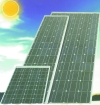

Southern Africa is well known for its sunny skies. The sun can provide an almost unlimited supply of energy, which can be converted into electrical energy. This energy can be used directly during the day or stored in batteries for use around the clock. Using solar energy has the advantage of not causing any damage to the environment.
The device used to convert the sun energy into DC electricity is the photovoltaic (PV) cell. The cells are moulded together into panels of various sizes. A typical size for such a solar panel is 1224 x 545 x 39,5 mm, which can supply 75 W at 12-14 V for more than five hours per day. For bigger installations these panels can be ganged together in order to supply virtually any load.
The applications for solar electricity have traditionally been to supply small households with lighting at night and to drive submersible borehole pumps to supply water to outlying areas during daytime. This has changed in recent times with more emphasis on the security installations on farms and at points where temporary power is required and it is not cost effective to lay long lengths of electrical cable.
Automatic gates have become very common in South Africa and quite often a farm gate is not within easy reach of electricity, which is the ideal place to install a solar electric installation with a small sealed lead acid battery to operate the gate day and night.
Electric fences on farms require small amounts of electricity at remote points and solar panels offer the best solution in many of these installations, even where the farm has electricity at certain points.
Solar panels are not inexpensive and are not currently appropriate to completely replace mains power, however for small applications where mains power is not readily available it can be the most cost effective solution.
For more information contact Spectrum Communications, 0800 82 1688, [email protected], www.spectrumcom.co.za
© Technews Publishing (Pty) Ltd. | All Rights Reserved.